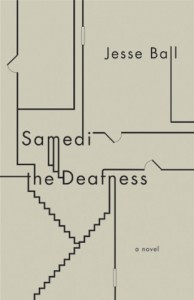 Given what Ball had given The Cupboard, I’d assumed all this time this would be a language-driven book. Or if not a language-driven book, much like something written by a Lish devotee, than an image-driven one. A Ben Marcus novel, or maybe like a Djuna Barnes one.
Given what Ball had given The Cupboard, I’d assumed all this time this would be a language-driven book. Or if not a language-driven book, much like something written by a Lish devotee, than an image-driven one. A Ben Marcus novel, or maybe like a Djuna Barnes one.
Imagine my surprise to read this morning a plot-driven novel.
I was only going to breeze through a few pages as a way to get ready for the morning’s writing. And then, four hours later: Finished.
Samedi the Deafness is a mystery novel. Its back cover’s blurbs do a fine job of summing it up: Kafka meets Hitchcock, or Kafka meets Fleming. Take your pick. The latter(s) in that one day James Sim leaves the house and comes across a man who’s just been stabbed and “learns” of a possible plot to destroy mankind. Events progress well outside of his own control. The former in that in those events we never know whom to trust, what is the truth, or even if such exists. Hence those quote marks a few sentences back.
Mysteries have always themselves been mysteries to me. How do they get written? How to have an entire twisting plot in one’s head throughout the writing of an entire novel? Ball, here, makes a mystery less mysterious; all you need is a habit of withholding information. James Sim, though we know he’s a mnemonist by trade, is never anything but a name to put to our alien perspective on the story’s gradually constructed setting. We rarely spend time with his thoughts and desires; though we see some of his dreams and flashbacks these never bring to light something previously hidden.
It’s not so much withholding information this book does as it is keeping us and its plot moving so rapidly that contextual information begins to feel less and less important. It’s rare that I read a book where I’m not asking “why” and “how”.
Samedi the Deafness is probably an instructive book to read after finishing Infinite jest, which I did last Friday. Both these books are constructed by accretion—a what put next to a what put next to a what. It’s in the location of those whats, Ball’s out in the world of his story, Wallace’s all filling the bodies of his characters, the gives these novels whatever difference they have.